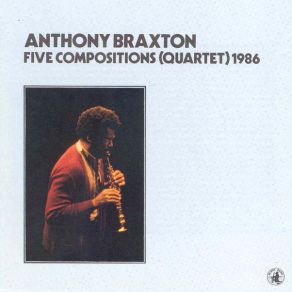Five Compositions (quartet) - 1986
Download links and information about Five Compositions (quartet) - 1986 by Anthony Braxton. This album was released in 1986 and it belongs to Jazz, Avant Garde Jazz genres. It contains 5 tracks with total duration of 43:15 minutes.

|
|
|---|---|
| Artist: | Anthony Braxton |
| Release date: | 1986 |
| Genre: | Jazz, Avant Garde Jazz |
| Tracks: | 5 |
| Duration: | 43:15 |
| Buy it NOW at: | |
| Buy on iTunes $9.99 | |
| Buy on Amazon $4.45 | |
Tracks
[Edit]| No. | Title | Length |
|---|---|---|
| 1. | Composition No. 131 (featuring Mark Dresser, David Rosenboom, Aleta Heyes) | 7:09 |
| 2. | Composition No. 99 (featuring Mark Dresser, David Rosenboom, Aleta Heyes) | 5:55 |
| 3. | Composition No. 124 (featuring Mark Dresser, David Rosenboom, Aleta Heyes) | 9:06 |
| 4. | Composition No. 122 (featuring Mark Dresser, David Rosenboom, Aleta Heyes) | 9:32 |
| 5. | Composition No. 101 (featuring Mark Dresser, David Rosenboom, Aleta Heyes) | 11:33 |
Details
[Edit]Anthony Braxton has spent his career plying a mostly inspired blend of complex compositions and free group improvisation, reserving choice spots in his works for the parade of talented jazz musicians he's employed. In the '70s, lean years for the avant-garde jazz set, his forbidding form of music forced him to make the occasional buck hustling chess games in New York's Washington Square Park. Fortunately, those days were short lived. Now Braxton is utilizing his considerable talents in the Wesleyan University music department as a professor. By the time of this mid-'80s quartet date, Braxton was just starting to get better compensated for his music and was also formalizing his heady compositional formula; this advance was helped along considerably by his stellar quartet, including pianist Marilyn Crispell, percussionist Gerry Hemingway, and bassist Mark Dresser. Five Compositions features this group minus Crispell (ably replaced by David Rosenboom). Things kick off with the relatively straightforward, Braxtonized bebop number "Composition No. 131," featuring a complex head statement followed by some swinging passages, albeit with plenty of gritty horn work by the leader. Some deliberate and mercurial chamber jazz follows on "Composition No. 88" and the livelier "Compostion No. 122," spotlighting Hemingway's incredibly intuitive and sophisticated drum work. Braxton loosens up a bit on the more free-form "Composition No. 124" and "Composition N. 101"; these last two feature Braxton's engaging soprano work and a distortion-riddled, bowed bass solo by Dresser. Knotty music to be sure, but some of Braxton's most rewarding.